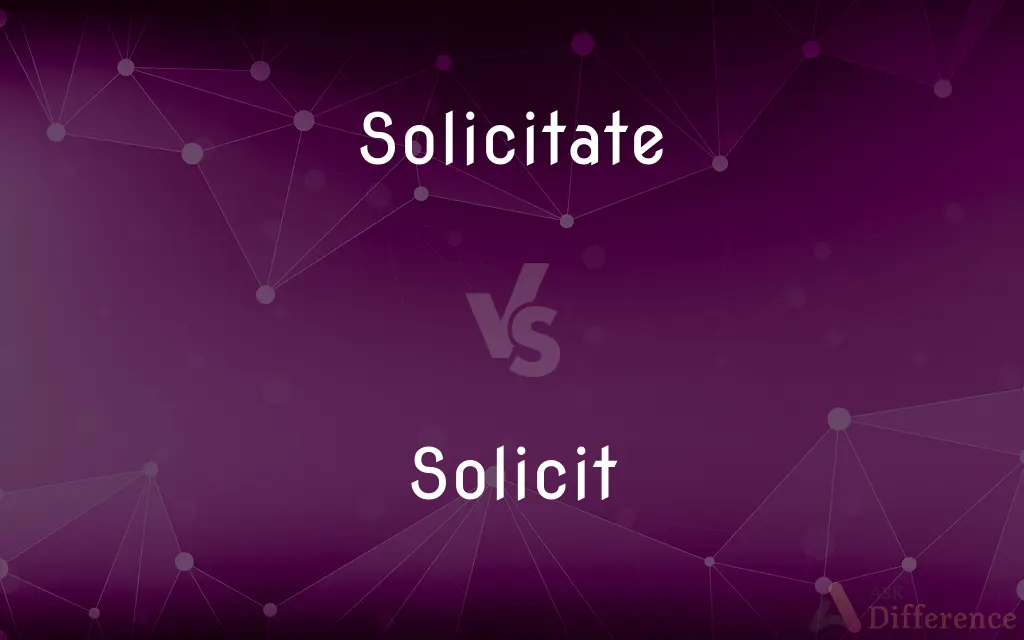Solicitate vs. Solicit — What's the Difference?
By Urooj Arif & Maham Liaqat — Updated on March 21, 2024
"Solicitate" is not a standard word in English; "solicit" means to ask for or try to obtain something.

Difference Between Solicitate and Solicit
Table of Contents
ADVERTISEMENT
Key Differences
"Solicit" refers to the act of asking for something, often in a formal or persistent manner, such as support, business, or information. On the other hand, "solicitate" is not recognized as a standard term in modern English usage and may be a misspelling or confusion with "solicit."
While "solicit" is commonly used in both legal and commercial contexts, for instance, soliciting donations or business, "solicitate" does not have a recognized usage. This distinction is important for clear communication, especially in professional or formal settings.
The term "solicit" can also imply seeking to obtain something by persuasion, entreaty, or formal application. In contrast, since "solicitate" lacks a standard definition, it does not convey a specific action or intent in English.
Understanding the correct use of "solicit" is crucial for effective communication, especially in contexts requiring precision, such as legal, business, or customer service interactions. The non-standard nature of "solicitate" means it should be avoided in formal or professional communication to prevent misunderstanding or ambiguity.
"Solicit" is the appropriate term to use when indicating the act of requesting or seeking something, and its application is widespread across various contexts, including legal, business, and personal communication. The term "solicitate" should be considered a non-standard or incorrect form and thus avoided in standard English communication.
ADVERTISEMENT
Comparison Chart
Definition
Not a standard English word
To ask for or try to obtain something from someone
Usage
No recognized usage
Common in legal, business, and personal contexts
Connotations
Lacks specific connotations due to non-standard status
Can imply seeking something by persuasion or formal request
Standard Recognition
Not recognized in standard English dictionaries or usage
Recognized and widely used in English
Importance
Should be avoided to prevent confusion or ambiguity
Crucial for clear communication in formal and professional settings
Compare with Definitions
Solicitate
Not a standard English term.
The word solicitate was used mistakenly in place of solicit.
Solicit
Asking for something, often formally.
The charity workers solicit donations from passersby.
Solicitate
Might be confused with "solicit".
Solicitate appears to be a typo or error for solicit.
Solicit
Seeking to obtain business.
Sales representatives often solicit new clients at trade shows.
Solicitate
Lacks a clear definition.
Searching for the meaning of solicitate yields no standard results.
Solicit
Requesting information or feedback.
The company solicits customer feedback through surveys.
Solicitate
Not found in recognized dictionaries.
Solicitate is not listed in major English language dictionaries.
Solicit
Legal context.
Soliciting in certain contexts, like for illegal transactions, is prohibited.
Solicitate
Should be avoided in formal communication.
Use solicit instead of the incorrect solicitate for clarity.
Solicit
Used in various communication contexts.
Politicians may solicit support during campaigns.
Solicitate
(obsolete) solicitous
Solicit
To seek to obtain by persuasion, entreaty, or formal application
A candidate who solicited votes among the factory workers.
Solicitate
To solicit.
Solicit
To petition persistently; importune
Solicited the neighbors for donations.
Solicitate
Solicitous.
Solicit
To commit the criminal offense of enticing or inciting (another) to commit an illegal act.
Solicit
To make solicitation or petition for something desired.
Solicit
To persistently endeavor to obtain an object, or bring about an event.
To solicit alms, or a favour
Solicit
To woo; to court.
Solicit
To make a petition.
Solicit
(archaic) To disturb or trouble; to harass.
Solicit
To urge the claims of; to plead; to act as solicitor for or with reference to.
Solicit
To disturb; to disquiet.
Solicit
(archaic) solicitation
Solicit
To ask from with earnestness; to make petition to; to apply to for obtaining something; as, to solicit person for alms.
Did I solicit theeFrom darkness to promote me?
Solicit
To endeavor to obtain; to seek; to plead for; as, to solicit an office; to solicit a favor.
I view my crime, but kindle at the view,Repent old pleasures, and solicit new.
Solicit
To awake or excite to action; to rouse desire in; to summon; to appeal to; to invite.
That fruit . . . solicited her longing eye.
Sounds and some tangible qualities solicit their proper senses, and force an entrance to the mind.
Solicit
To urge the claims of; to plead; to act as solicitor for or with reference to.
ShouldMy brother henceforth study to forgetThe vow that he hath made thee, I would everSolicit thy deserts.
Solicit
To disturb; to disquiet; - a Latinism rarely used.
Hath any ill solicited thine ears?
But anxious fears solicit my weak breast.
Solicit
Make a solicitation or entreaty for something; request urgently or persistently;
Henry IV solicited the Pope for a divorce
My neighbor keeps soliciting money for different charities
Solicit
Make amorous advances towards;
John is courting Mary
Solicit
Approach with an offer of sexual favors;
He was solicited by a prostitute
The young man was caught soliciting in the park
Solicit
Incite, move, or persuade to some act of lawlessness or insubordination;
He was accused of soliciting his colleagues to destroy the documents
Solicit
Make a solicitation or petition for something desired;
She is too shy to solicit
Common Curiosities
What does "solicit" mean?
"Solicit" means to ask for something, often in a formal or persistent manner.
Can "solicit" be used in a legal context?
Yes, "solicit" is often used in legal contexts, such as soliciting donations or business, and can have specific legal implications.
What should I use instead of "solicitate"?
You should use "solicit" instead of "solicitate," as the latter is not a recognized term in standard English.
Is "solicitate" a word in English?
"Solicitate" is not recognized as a standard word in English; it may be a misspelling or confusion with "solicit".
Why is it important to use "solicit" correctly?
Using "solicit" correctly is important for clear communication, especially in professional or formal settings.
Does "solicit" only apply to business contexts?
No, "solicit" can be used in various contexts, including personal, legal, and social situations.
How can "solicit" be used in a sentence?
e.g., "The organization solicits contributions from community members."
Can "solicit" be used in marketing?
Yes, "solicit" is commonly used in marketing to describe the act of seeking business or customer engagement.
Can "solicit" be used interchangeably with "request"?
While "solicit" and "request" are similar, "solicit" often implies a more formal or persistent effort to obtain something.
Can "solicit" have a negative connotation?
"Solicit" can have a negative connotation in certain contexts, such as soliciting illegal business or services.
Is "solicit" a formal term?
"Solicit" can be used both in formal contexts, such as legal or business communication, and in more casual settings.
How can I remember the difference between "solicit" and "solicitate"?
Remember that "solicitate" is not a standard word, so focus on using "solicit" correctly in various contexts.
What is the noun form of "solicit"?
The noun form of "solicit" is "solicitation," referring to the act of soliciting.
What is the opposite of "solicit"?
The opposite of "solicit" could be "offer" or "provide," depending on the context.
Is "solicitate" ever correct to use?
"Solicitate" is generally considered incorrect or non-standard in English and should be avoided in favor of "solicit".
Share Your Discovery

Previous Comparison
Deer vs. Horse
Next Comparison
Peplum vs. PablumAuthor Spotlight
Written by
Urooj ArifUrooj is a skilled content writer at Ask Difference, known for her exceptional ability to simplify complex topics into engaging and informative content. With a passion for research and a flair for clear, concise writing, she consistently delivers articles that resonate with our diverse audience.
Co-written by
Maham Liaqat














































